Uniform Commercial Code § 1-201. General Definitions:
(a) Unless the context otherwise requires, words or phrases defined in this section, or in the additional definitions contained in other articles of the Uniform Commercial Code that apply to particular articles or parts thereof, have the meanings stated.
(b) Subject to definitions contained in other articles of the Uniform Commercial Code that apply to particular articles or parts thereof:
(27) “Person” means an individual, corporation, business trust, estate, trust, partnership, limited liability company, association, joint venture, government, governmental subdivision, agency, or instrumentality, public corporation, or any other legal or commercial entity.
26 United States Code (U.S. Code) § 7701 – Definitions:
The term “person” shall be construed to mean and include an individual, a trust, estate, partnership, association, company or corporation.
27 Code of Federal Regulations (CFR) § 72.11 – Meaning of terms.:
Person. An individual, trust, estate, partnership, association, company or a corporation.
15 U.S. Code § 1602 – Definitions and rules of construction:
(e) The term “person” means a natural person or an organization.
18 U.S. Code § 1961 – Definitions:
(3) “person” includes any individual or entity capable of holding a legal or beneficial interest in property;
Social Security Act of 1935 Volume 1:
The term “person” means an ‘individual,’ a ‘trust‘ or ‘estate,‘ a partnership, or a corporation.”
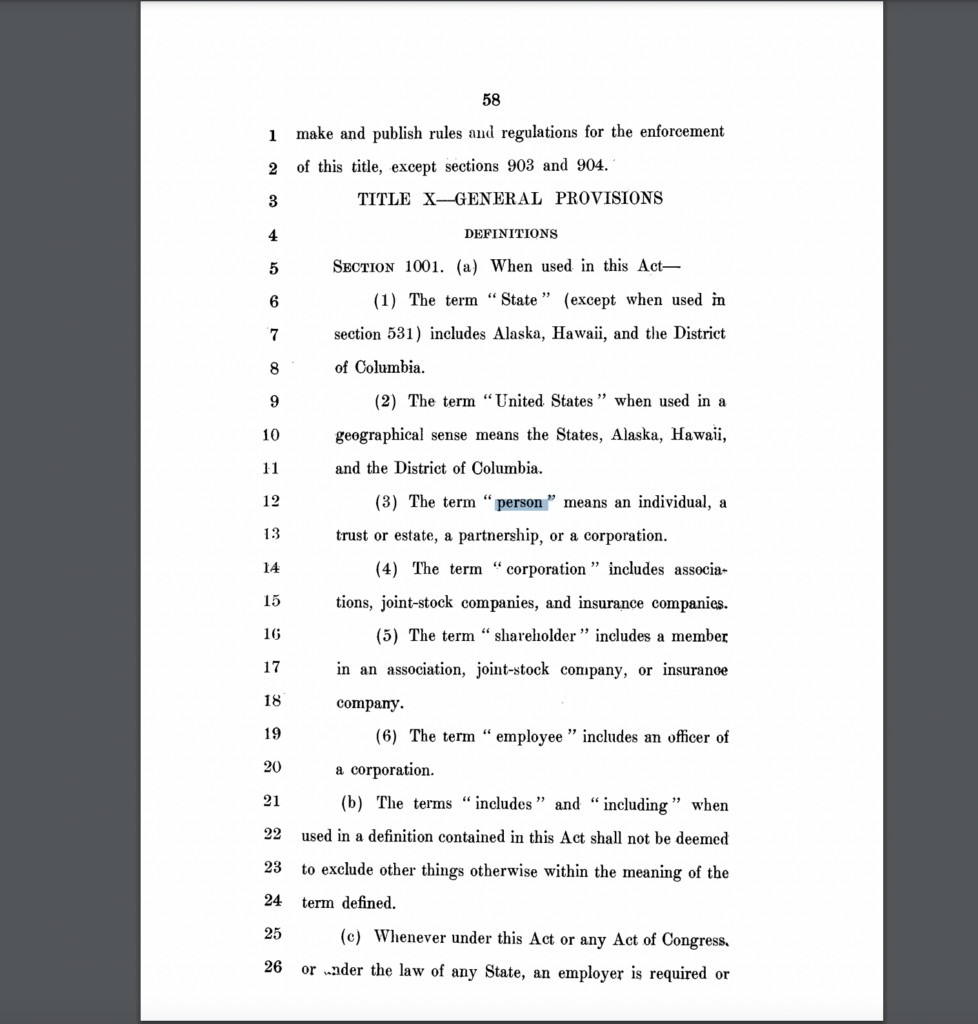
Black’s Law Dictionary 1st Edition, page 892:
“A man considered according to the rank he holds in society, with all the rights to which the place he holds entitles him, and the duties which it imposes. 1 Bouv. Inst. no. 137.
Persons are divided by law into natural and artificial. Natural persons are such as the God of nature formed us; artificial are such as are created and devised by human laws, for the purposes of society and government, which are called “corporations” or “bodies politic.” 1 Bl. Comm. 123.”
Black’s Law Dictionary 2nd Edition, page 895:
“A man considered according to , the rank h e holds in society, with all the rights to which the place he holds entitles him, and the duties which it imposes. 1 Bouv. Inst. no. 137.A human being considered as capable of having rights and of being charged with duties; while a “thing” is the object over which rights may be· exercised.-Artificial persons. Such as are created and devised by law for the purposes of society and government, called “corporations” or bodies politic.” -Natural persons. Such as are formed by nature, as distinguished from artificial persons, or corporations. -Private person. An individual who is not the incumbent of an office.”
Black’s Law Dictionary 4th Edition, pages 1299-1300:
“A man considered according to the rank he holds in society, with all the right to which the place he holds entitles him, and the du- ties which it imposes. People v. R. Co., 134 N.Y. 506, 31 N.E. 873.The word in its natural and usual signification includes women as well as men. Commonwealth v. Welosky, 276 Mass. 398, 177 N.E. 656.
Term may include artificial beings, as corpora- tions, 1 Bla.Com. 123; 4 Bingh. 669; People v. Com’rs of Taxes, 23 N.Y. 242; quasi-corpora- tions, Sedgw. Stat. & Const. L. 372; L. R. 5 App. Cas. 857; territorial corporations, Seymour v. School District, 53 Conn. 507, 3 A. 552; and for- eign corporations, People v. McLean, 80 N.Y. 259; under statutes, forbidding the taking of property without due process of law and giving to all per- sons the equal protection of the laws, Smyth v. Ames, 18 S.Ct. 418, 169 U.S. 466, 42 L.Ed. 819; Gulf, C. & S. F. R. Co. v. Ellis, 17 S.Ct. 255, 165 U.S. 150, 41 L.Ed. 666; concerning claims arising from Indian depredations, U. S. v. Transp. Co., 17 S.Ct. 206, 164 U.S. 686, 41 L.Ed. 599; relating to taxation and the revenue laws, People v. Mc- Lean, 80 N.Y. 254; to attachments, Bray v. Wal- lingford, 20 Conn. 416; usurious contracts, Phil- adelphia Loan Co. v. Towner, 13 Conn. 249; ap- plying to limitation of actions, Olcott v. R. Co., 20 N.Y. 210, 75 Am.Dec. 393; North Mo. R. Co. v. Akers, 4 Kan. 453, 96 Am.Dec. 183; and concern- ing the admissibility as a witness of a party in his own behalf when the opposite party is a liv- ing person, La Farge v. Ins. Co., 22 N.Y. 352. A. corporation is also a person under a penal stat- ute; U. S. v. Amedy, 11 Wheat. 392, 6 L.Ed. 502. Corporations are “persons” as that word is used in the first clause of the XIVth Amendment; Cov- ington & L. Turnp. Co. v. Sandford, 17 S.Ct. 198, 164 U.S. 578, 41 L.Ed. 560; Smyth v. Ames, 18 S.Ct. 418, 169 U.S. 466, 42 L.Ed. 819; People v. Fire Ass’n, 92 N.Y. 311, 44 Am.Rep. 380; U. S. v. Supply Co., 30 S.Ct. 15, 215 U.S. 50, 54 L.Ed. 87; contra, Central P. R. Co. v. Board, 60 Cal. 35. But a corporation of another state is not a “per- son” within the jurisdiction of the state until it has complied with the conditions of admission to do business in the state, Fire Ass’n of Phila. v. New York, 7 S.Ct. 108, 119 U.S. 110, 30 L.Ed. 342; and a statutory requirement of such conditions is not in conflict with the XIVth Amendment; Pembina Consol. S. M. & M. Co. v. Pennsylvania, 8 S.Ct. 737, 125 U.S. 181, 189, 31 L.Ed. 650.
It may include partnerships. In re Julian, D. C.Pa., 22 F.Supp. 97, 99. Also firms. State ex rel. Joseph R. Peebles Sons Co. v. State Board of Pharmacy, 127 Ohio St. 513, 189 N.E. 447, 448.
“Persons” are of two kinds, natural and artificial. A natural person is a human being. Artificial persons in- clude a collection or succession of natural persons forming a corporation; a collection of property to which the law attributes the capacity of having rights and duties. The latter class of artificial persons is recognized only to a limited extent in our law. Examples are the estate of a bankrupt or deceased person. Hogan v. Greenfield, 58 Wyo. 13, 122 P.2d 850, 853.
It has been held that when the word person is used in a legislative act, natural persons will be intended unless something appear in the context to show that it applies to artificial persons, Blair v. Worley, 1 Scam., Ill., 178; Ap- peal of Fox, 112 Pa. 337 ; 4 A. 149 ; but as a rule corpora- tions will be considered persons within the statutes unless the intention of the legislature is manifestly to exclude them. Stribbling v. Bank, 5 Rand., Va., 132.
A county is a person in a legal sense, Lancaster Co. v. Trimble, 34 Neb. 752, 52 N.W. 711; but a sovereign is not; In re Fox, 52 N.Y. 535, 11 Am.Rep. 751; U. S. v. Fox, 94 U.S. 315, 24 L.Ed. 192, but contra within the meaning of a statute, providing a penalty for ‘the fraudulent alteration of a public record with intent that any “person” be de- frauded, Martin v. State, 24 Tex. 61; and within the meaning of a covenant for quiet and peaceful possession against all and every person or persons; Giddings v. Holter, 19 Mont. 263, 48 P. 8. An Indian is a person, U. S. v. Crook, 5 Dill. 459, Fed.Cas.No.14,891; and a slave was so considered, in so far, as to be capable of committing a riot .in conjunction with white men, State v. Thackam, 1 Bay, S.C., 358. The estate of a decedent is a person, Bill- ings v. State, 107 Ind. 54, 6 N.E. 914, 7 N.E. 763, 57 Am. Rep. 77; and where the statute makes the owner of a dog liable for injuries to any person, it includes the property of such person, Brewer v. Crosby, 11 Gray, Mass., 29; but where the statute provided damages for the bite of a dog which had previously bitten a person, it was held insuffi- cient to show that the dog had previously bitten a goat, [1896] 2 Q.B. 109; a dog will not be included in the word in an act which authorizes a person to kill dogs running at large, Heisrodt v. Hackett, 34 Mich. 283, 22 Am.Rep. 529.
Where the statute prohibited any person from pursuing his usual vocation on the Lord’s Day, it was held to apply to a judge holding court. Bass v. Irvin, 49 Ga. 436.
A child en ventre sa mere is not a person. Dietrich v. Northampton, 138 Mass. 14, 52 Am.Rep. 242; but an in- fant is so considered; Madden v. Springfield, 131 Mass. 441.
In the United States bankrupty act of 1898, it is provided that the word “persons” shall include corporations, except where otherwise specified, and officers, partnerships, and women, and, when used with reference to the commission of acts which are therein forbidden, shall include persons who are participants in the forbidden acts, and the agents, officers, and members of the board of directors or trustees, or their controlling bodies, of corporations. 11 U.S.C.A. § 1.
Persons are the subject of rights and duties; and, as a subject of a right, the person is the object of the correla- tive duty, and conversely. The subject of a right has been called by Professor Holland, the person of inherence ; the subject of a duty, the person of incidence. “Entitled” and “bound” are the terms in common use in English and for most purposes they are adequate. Every full citizen is a person; other human beings, namely, subjects who are not citizens, may be persons. But not every human being is necessarily a person, for a person is capable of rights and duties, and there may well be human beings having no legal rights, as was the case with slaves in English law. •• *
A person is such, not because he is human, but because rights and duties are ascribed to him. The person is the legal subject or substance of which the rights and duties are attributes. An individual human being considered as having such attributes is what lawyers call a natural per- son. Pollock, First Book of Jurispr. 110. Gray, Nature and Sources of Law, ch. IL”
Blacks Law Dictionary 7th Edition, pages 1162-1163:
“1. A human being. 2. An entity (such as a corporation) that is recognized by law as having the rights and duties of a human being. 3. The living body of a human being <contra band found on the smuggler’s person > .
“So far as legal theory is concerned, a person is any being whom the law regards as capable of rights and duties. Any being that is so capable is a person, whether a human being or not, and no being that is not so capable is a person, even though he be a man. Persons are the substances of which rights and duties are the attributes. It is only in this respect that persons possess juridical significance, and this is the exclusive point of view from which personality receives legal recognition.” John Salmond, Jurisprudence 318 (Glanville L. Williams ed., 10th ed. 1947).
artificial person. An entity, such as a cor poration, created by law and given certain legal rights and duties of a human being; a being, real or imaginary, who for the purpose of legal reasoning is treated more or less as a human being. – Also termed fictitious per son; juristic person; legal person; moral per son.
disabled person. A person who has a dis ability. See DISABILITY.
fictitious person. See artificial person .
interested person. A person having a prop erty right in or claim against a thing, such as a trust or decedent’s estate.
juristic person. See artificial person . legal person. See artificial person . moral person. See artificial person .
natural person. A human being, as distin guished from an artificial person created by law.
person in loco parentis (in loh-koh pa-ren tis). A person acting in the place of a parent; a person who has assumed the obligations of a parent without formally adopting the child.
person of incidence. The person against whom a right is enforceable; a person who owes a legal duty.
person of inherence (in-heer-ants) . The person in whom a legal right is vested; the owner of a right.
private person. 1. A person who does not hold public office or serve in the military. 2. Civil law. An entity such as a corporation or partnership that is governed by private law.
protected person. 1. A person for whom a conservator has been appointed or other pro tective order has been made. 2. Int’l law. A person who is protected by a rule of interna tional law; esp., one who is in the hands of an occupying force during a conflict. • Protected persons are entitled to a standard of treat ment (including a prohibition on coercion and corporal punishment) by the Geneva Conven tion Relative to the Protection of Civilian Persons in Time of War (1949). 3. English law. An inhabitant of a protectorate of the United Kingdom. • Though not a British sub ject, such a person is given diplomatic protec tion by the Crown.”
Blacks Law Dictionary 7th Edition, pages 3618-3619:
“1. A human being. — Also termed natural person.
absent person.Louisiana law. A person who has no representative in the state and whose whereabouts are not known and cannot be ascertained by diligent effort. La. Civ. Code art. 47.
adult disabled person.A child over the age of 18 for whom a parent continues to have a duty of support.
associated person.See ASSOCIATED PERSON.
disabled person.A person who has a mental or physical impairment. See DISABILITY. disappeared person.See DISAPPEARED PERSON.
interested person.A person having a property right in or claim against a thing, such as a trust or decedent’s estate. • The meaning may expand to include an entity, such as a business that is a creditor of a decedent. — Abbr. IP.
person in loco parentis (in loh-koh p<<schwa>>-ren-tis). A person who acts in place of a parent, either temporarily (as a schoolteacher does) or indefinitely (as a stepparent does); a person who has assumed the obligations of a parent without formally adopting the child. See IN LOCO PARENTIS. [Cases: Parent and Child 15. C.J.S. Parent and Child §§ 345–350, 357–358.]
person in need of supervision.See child in need of supervision under CHILD. — Abbr. PINS.
person of incidence.The person against whom a right is enforceable; a person who owes a legal duty. • The meaning may expand to include an entity, such as an insurance company.
person of inherence (in-heer-<<schwa>>nts). The person in whom a legal right is vested; the owner of a right. • The meaning may expand to include an entity.
person of interest.A person who is the subject of a police investigation but who has not been identified by investigators as being suspected of committing the crime itself.
person not deceased.A person who is either living or not yet born.
person of opposite sex sharing living quarters.See POSSLQ.
person with ordinary skill in the art. See PERSON WITH ORDINARY SKILL IN THE ART.
private person. 1. A person who does not hold public office or serve in the military. 2.Civil law. An entity such as a corporation or partnership that is governed by private law.
protected person. 1. A person for whom a conservator has been appointed or other protective order has been made. [Cases: Guardian and Ward 9.5, 17; Mental Health 104. C.J.S. Insane Persons§ 111.] 2.Int’l law. A person who is protected by a rule of international law; esp., one who is in the hands of an occupying force during a conflict. • Protected persons are entitled to a standard of treatment (including a prohibition on coercion and corporal punishment) by the Geneva Convention Relative to the Protection of Civilian Persons in Time of War (1949).3.English law. An inhabitant of a protectorate of the United Kingdom. • Though not a British subject, such a person is given diplomatic protection by the Crown.
2. The living body of a human being <contraband found on the smuggler’s person>.3. An entity (such as a corporation) that is recognized by law as having the rights and duties of a human being. • In this sense, the term includes partnerships and other associations, whether incorporated or unincorporated.“So far as legal theory is concerned, a person is any being whom the law regards as capable of rights and duties. Any being that is so capable is a person, whether a human being or not, and no being that is not so capable is a person, even though he be a man. Persons are the substances of which rights and duties are the attributes. It is only in this respect that persons possess juridical significance, and this is the exclusive point of view from which personality receives legal recognition.” John Salmond, Jurisprudence 318 (Glanville L. Williams ed., 10th ed. 1947).
artificial person.An entity, such as a corporation, created by law and given certain legal rights and duties of a human being; a being, real or imaginary, who for the purpose of legal reasoning is treated more or less as a human being. • An entity is a person for purposes of the Due Process and Equal Protection Clauses but is not a citizen for purposes of the Privileges and Immunities Clauses in Article IV, § 2, and in the Fourteenth Amendment. — Also termed fictitious person; juristic person; juridical person; legal person; moral person. Cf. LEGAL ENTITY. [Cases: Corporations 1.1(2). C.J.S. Corporations § 2.]





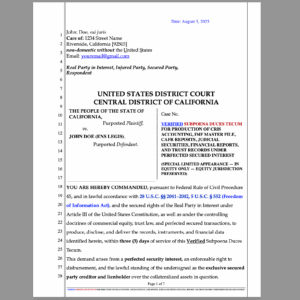
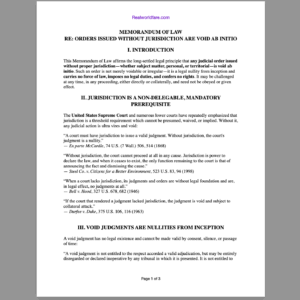
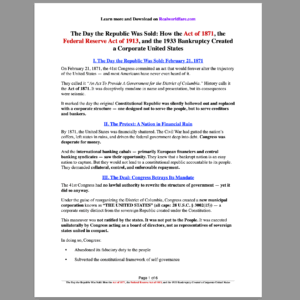
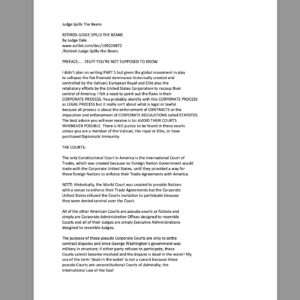
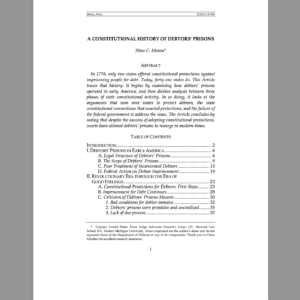



Recent Comments